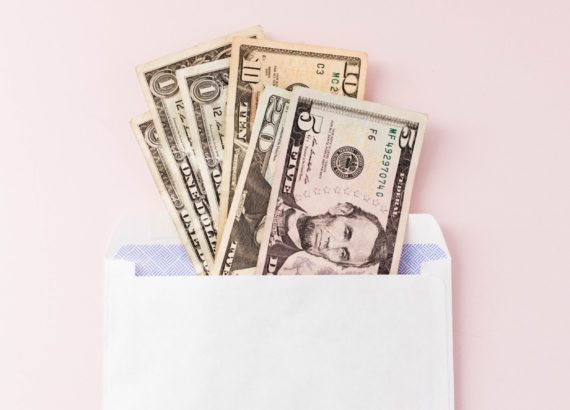5 Ways to Save When You’re Broke as Hell

It’s easy to save money when you have money, right?
Saving money especially when you’re broke as hell may seem impossible. How are you supposed to save money when you have absolutely no money to your name?
I know how real the struggle is because I’ve been there.
I think most of us know that we need to save money, especially for the what-ifs in life.
What if I lose my job?
What if the car breaks down?
What if my dog needs to go to the vet?
What if my child gets sick?
You get the idea. The point is that life isn’t perfect, and I think we’ve all dealt with our own what-if’s that we weren’t prepared for.
We worked our fingers to the bone and managed to save a few hundred dollars only to have to blow it on a new refrigerator after ours craps out.
I’ve been there.
You think you’ll never be able to get ahead. You’ll never be able to buy your kid that new video game or those new Jordan’s. You’ll never be able to go on vacation or quit that second job or hell even your day job. You know the one, that’s sucking the life out of you and making you an absolute delight to be around?
Been there.
I’ve been able to slowly build up my nest egg for the what-ifs in life; like taking my sweet kitty to the vet last month for an ultrasound only to discover she has stomach cancer. Then if that wasn’t bad enough, they slapped me a bill close to $500.
$500 is a ton of money to me as I’m sure it is to you but instead of worrying about the vet bill or worrying about how I’m actually going to pay it, I worried about my fur baby and didn’t give the bill a second thought.
I’m only telling you this now to make a point.
I was right where you’re at now. I was up to my eyeballs in student loan debt, car note, rent. I was in a dead-end job making $40K a year which may seem like a decent wage but not when you live in Colorado where the cost of living is 30% higher than the rest of the country.
I was struggling to pay my bills and barely had anything left over for fun, let alone saving. However, I discovered a few tips and tricks along the way that had a drastic impact on my savings and I’m hoping some of them will help you too.
1. Open a Savings Account
Having money in one place makes it entirely too easy to spend. Having money in a different account or better yet, a different bank can help you save. You know the saying, out of sight, out of mind?
If you’re one who tends to check your bank balance a ton, you may want to keep your checking and your savings in different financial institutions, so you’re not temped to spend the money you worked so hard to save.
Most companies require you to have direct deposit which is fantastic because you can decide how much of your check to allocate to your different accounts.
If your company doesn’t offer direct deposit, you can set up an automatic transfer from your checking account to your savings account.
If you decide to set up a savings account at a different bank, you can still set up automatic transfers and often times, they’re either free or just a few bucks.
The first thing that helped me in my quest to save more was opening a savings account at a different institution. I already had a checking and a savings account at one bank but found that when I saw the balances in total, I would start to dip into my savings.
I ended up opening a savings account through Discover Bank and having $40 transferred into it from every paycheck. I rarely paid attention to the money in my Discover account and after the first year, I had saved about $1,000.
Even if you don’t have an extra $40 every paycheck, saving anything will help you in the long run. Saving $5 a week will give you an extra $260 at the end of your first year. That’s $260 that probably would have been spent.
2. Use Cash
Use cash instead of your credit card.
Using cash instead of your credit cards will help you stick to a budget because you have a set amount of money to spend.
Say you need to run to the store to buy milk, eggs and bread. If all you have in your wallet is a $20, then you’ll stick very closely to your grocery list.
If, however, you run to the store with that same shopping list and a credit card in your wallet, chances are you’re going to add a few extra items to your cart and walk away spending a lot more than the $20 you had intended.
Cash will keep your budget in check, allowing you to know exactly how much you’ve spent and how much you have left to spend.
I use this method sporadically through the year, especially if I’ve either just let my credit card balance get completely out of hand, hello Christmas.
Or if I’m preparing for a large expense, like a vacation. I’ll start to watch my budget more closely and use cash as a way of giving my credit cards a break from all the swiping.
The best way I have found to do this is the cash envelope system. It helps me stay accountable by allocating a certain dollar amount to each of my budget categories and once the cash is gone, it’s gone, at least until the next payday or even the next month.
3. Shop Online
I know this tip is counter to what I just said but if you’re someone who has trouble with cash and are going to use your credit or debit card regardless, then shopping online is so much better than shopping in the actual store.
When you shop online, you tend to evaluate what’s in your cart, especially when you see the total.
Shopping online also reduces your chances of impulse buying since the products aren’t staring you in the face like they are in the store. Instead you have to go searching through the website for the items that you want.
I am always genuinely shocked when I get up to the register and see the total of my purchases.
I went to Charming Charlies last weekend and bought a new necklace and two new bracelets, and I walked out of there spending $57 bucks.
On a necklace and two bracelets, are you kidding me!?
Now if I would have stayed at home and shopped online, I probably would have spent half that amount and I’d go back and forth deciding on whether or not I really wanted to spend that much money.
4. Cancel Everything
I actually don’t mean cancel everything, but I do mean, cancel everything you don’t need or use.
If you rarely go to the gym but you have a membership, cancel it.
If you have cable but only really watch network TV, cancel it.
Cancel those magazine subscriptions and read them online instead.
Cancel your music subscription and listen free with ads. You can bare a 30 second ad here and there to save a buck 20 a year, right?
Cancel that Audible subscription and listen to podcasts for a while.
Every little bit counts and while $9.99 a month doesn’t seem like a lot; it adds up especially if you have several subscriptions.
I recently cancelled two subscription boxes and a magazine subscription and saved about $42 a month which adds up to an extra $500 a year.
I absolutely love getting goodies in the mail and a subscription box is perfect for that, but I was just throwing money away because I either wasn’t really in to the products or just never used them. So, I ended up spending money and cluttering up my house at the same time.
As far as the magazine subscription goes, it really wasn’t imperative that I know why Meghan Markle and Prince Harry named their kid Archie. The magazine was a huge time suck and was not a necessary expense, so it had to go.
5. No Spend Month
Okay this might seem a bit drastic and you’re right it is, but it totally works.
This doesn’t mean that you can’t spend any money during the month. For goodness sake please pay your rent!
A no spend month is where you don’t spend your money on anything frivolous.
Frivolous spending could be anything.
It would be buying a sandwich for lunch or getting a drink with a co-worker after work. It could be buying that candy bar at the grocery store or getting your nails done.
During your no-spend month, you’ll only spend your money on bills and required expenses such as gas for your car and groceries for your lunches.
This doesn’t mean that you have to be a hermit during your no spend month.
Quite the opposite.
When I go on a no spend month, I generally do a lot more picnics in the park, at least during the summer, making lunch out of whatever I have on hand.
This is a great way to save money without feeling deprived of entertainment.
If going on a no spend month seems too drastic for you, you can always go on no spend days.
Maybe you don’t spend money on Monday’s, Wednesday’s and Friday’s. As long as you don’t go nuts during your spending days, you should be able to squirrel away a few bucks every week.
I personally go on a no spend month several times per year.
January is usually a no spend month for me because I’m trying to recover financially from the holiday’s.
I tend to do another one in the summer, usually right after a vacation and then one more in October so I can jump start my savings for Black Friday and Christmas.
Whatever tip or tips you chose to implement, you won’t be sorry.
You may not see the impact of your efforts initially but if you stick with them, you’ll reap rewards that you didn’t even think were possible.








No Comments